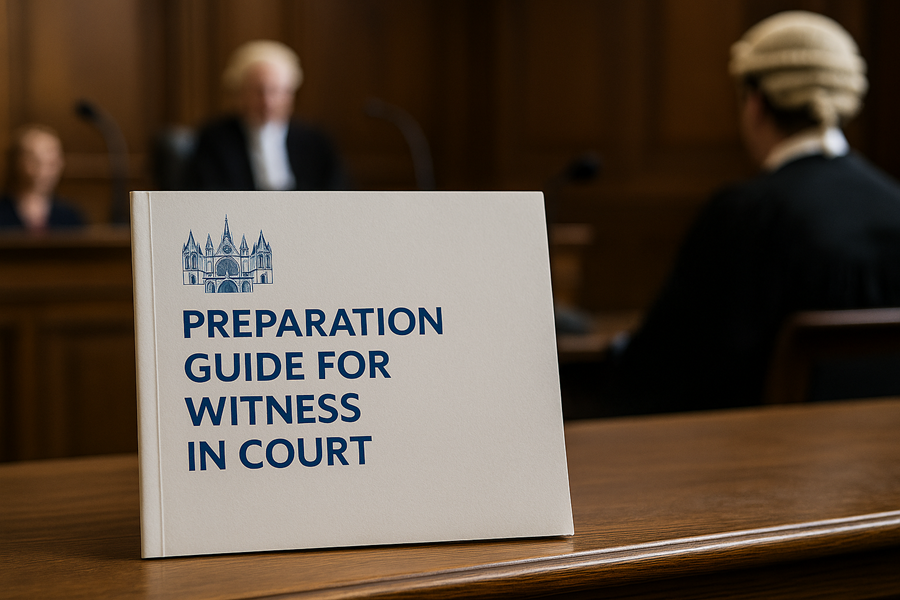Preparation guide for witness in court UK

Being a witness in court, whether in a criminal, civil or family case, involves providing clear and accurate testimony to help the judge or jury make an informed decision. Good preparation is essential to ensure you feel calm and understand how the hearing will proceed. In the UK, hearings may be held in Magistrates’ Court, Crown Court or Family Court, each of which has its own specific rules. For any specific questions, it is advisable to consult a solicitor specialising in the relevant area of law.

Key Takeaway: As a witness in court, what should I do and how should I prepare for the day of the hearing?
This guide aims to help witnesses understand their responsibilities, the protocol and the documents they need to prepare.
What types of courts exist in the UK and what are the roles of each participant?
To better understand how a hearing works and prepare yourself effectively, it is essential to know the different types of courts in the UK and the roles played by the people involved.
Types of courts in the UK
The Magistrates’ Court is the first-tier court that mainly deals with minor cases, such as small offences, traffic violations, or other less serious matters. When considering how long does magistrates’ court hearing last, these hearingsare usually short and straightforward, often just a few hours, allowing cases to be processed quickly.
The Crown Court, on the other hand, deals with more serious offences, including major crimes. In this court room, it is common for a jury to be present to determine the outcome. Proceedings follow a stricter and more formal protocol, including adherence to the established crown court dress code.
Finally, the Family Court is dedicated to family-related issues, such as divorce, child custody, and decisions concerning children’s welfare and protection. While emotions often run higher in this setting, the procedure remains formal and structured.
Roles in the courtroom
The witness has the essential responsibility of giving a clear, accurate and truthful account of the facts they know through a witness statement for court. In some situations, a person may have valid reasons for not attending court as a witness, though this is strictly regulated by law. Some may also wonder can I refuse to be a witness in court. This is possible only in limited circumstances.
The defendant has specific rights. They may present their side of the story and defend themselves with the support of a solicitor or barrister.
Solicitors represent either the defence or the prosecution. Their role is to present evidence, question witnesses, and persuade the judge or jury of their arguments. A character witness for court may also be called to speak about the defendant’s reputation or behaviour.
Finally, the judge or magistrate acts as the conductor of the hearing. They manage the proceedings, ensure that protocol is respected, and interact with everyone involved to guarantee that justice is delivered fairly and impartially.
How does a day in court typically unfold?
A day in court can feel daunting, especially for someone appearing as a witness. To manage the experience better, it helps to know what typically happens and how to prepare.
Before the hearing
It is advisable to arrive around 30 minutes early to allow time for security checks and to report to the court registry. Many people wonder how long does court last in a day; the length varies depending on the type and complexity of the case being heard, typically ranging from a few hours to a full day. Before the hearing starts, it is useful to review your statement and prepare yourself mentally to remain calm.
During the hearing
The order of events usually follows a set pattern: the judge opens the session, the evidence is presented, witnesses are called, and then lawyers ask their questions. A witness is called to the stand at the time set by the court. To give effective evidence, it is recommended to follow the rules of courtroom etiquette, such as standing when the judge enters, staying polite, answering clearly and calmly, and avoiding unnecessary reactions.
After the hearing
At the end of the session, the judge may provide a summary of the decisions or give instructions about the next steps in the case. The witness may be asked to collect documents or receive information about future hearings. This marks the formal end of their role for the day.
How should you prepare before going to court?
Preparation is not just about showing up on the day; it’s about having the right documents, dressing appropriately, and knowing how to behave in front of the judge and lawyers.
Documents and information to prepare
The cornerstone of your preparation is your written testimony, also known as a witness statement. Knowing how to write a witness statement for court is essential: it should be clear, factual, and based only on what you personally saw or heard.
In family matters, you may also rely on a witness statement family court example/template to guide your drafting. To draft it effectively, present the facts in chronological order, avoid personal opinions, and keep your wording concise. Each statement should be supported by concrete details to help the judge gain a reliable picture of the situation.
In addition to this document, make sure to gather all relevant evidence (emails, photographs, contracts, certificates) and bring personal notes that will help you recall the timeline of events on the day of the hearing. If attending a sentencing hearing, you should also know what to take to court for sentencing UK: your official ID, witness statement, any relevant documents or evidence, and personal notes.
Clothing and appearance
Courtrooms are formal environments, and your appearance matters. Understanding what to wear to court is crucial for making a good impression. If you wonder what to wear to court female UK or more generally what to wear to court as a witness, the rule of thumb is to choose formal and discreet clothing.
The dress code for court generally excludes flashy colours, casual wear, or inappropriate accessories. Neutral tones, clean shoes, and a neat presentation are always appropriate as court attire. For the Crown Court in particular, the crown court dress code is stricter, reflecting the solemnity of more serious cases.
Behavioural preparation
Good courtroom etiquette is also about how you act and speak. Only speak when invited, listen carefully to each question, and answer calmly, even under pressure. Keep your sentences short and precise, without exaggeration or speculation.
For example, if a lawyer asks, “Did you see the defendant at the scene?”, a good answer would be “Yes, I saw him at the entrance at around 7pm.” A poor answer would be “Yes, I saw him and I’m sure he was planning something.” The first is factual, the second is speculative. Remaining polite, composed, and focused on facts is the best way to be a credible and helpful witness.
How should you address people in the courtroom?
Each participant in the court room has a specific role, and there are clear rules on how to communicate appropriately.
Addressing the judge or magistrates
It is important to distinguish between a judge and magistrate.
- The judge usually presides over more serious cases, such as those heard in the Crown Court. You should address them as “Your Honour,” stand when speaking, and use a clear and respectful tone.
- A magistrate, who often volunteer but are trained in law, presides over hearings in the Magistrates’ Court. They should be addressed as “Sir” or “Madam.” As with judges, you must never interrupt them and should only speak when invited to do so.
Addressing the lawyers
When called to give evidence, you should only respond to questions asked by the defence or prosecution lawyers. Do not interrupt them, and always wait until the question has been fully asked before replying. Your answers should be short, precise, and based only on facts.
Interaction with other witnesses or the public
Outside of giving evidence, avoid discussing the case with other witnesses, as confidentiality must be respected. Courtesy and discretion are essential. In certain jurisdictions, such as the Family Court, the question who can attend a family court hearing is strictly regulated. Usually, only those directly involved in the case and authorised individuals are permitted.
In other hearings, the public may be admitted under certain conditions. It is also important to know how old do you have to be to watch a court case UK. In most cases, you must be at least 14 years old, unless the court decides otherwise.
Do I need a solicitor to testify in court?
As a witness, you are not legally required to have a solicitor when giving evidence, since your main role is simply to recount the facts you observed. However, in some situations, having a solicitor can be very helpful, for example:
- If you need to prepare a complex and detailed witness statement for court.
- If you are concerned that your testimony could have legal consequences for you.
- If you are called in a sensitive case (family matters, employment disputes, criminal cases).
- If you have practical questions, such as valid reasons for not attending court as a witness.
A solicitor can advise you on how to write a witness statement for court, explain your rights and obligations, and guide you through the hearing process.
FAQs
Can I bring my child to court?
As a general rule, it is not recommended to bring children, unless the judge exceptionally allows their presence, particularly in Family Court settings.
Can I refuse to give evidence in court?
In some circumstances, it is possible to give valid reasons for not attending court as a witness, but this must be approved and is strictly regulated by law.
How long does a court hearing last?
Generally, how long does court last in a day ranges from a few hours to a full day, depending on the complexity and number of cases being heard.
A witness’s testimony plays an important role in the course of a trial, as it helps the judge or jury gain an accurate understanding of the facts. Careful preparation and a calm attitude strengthen your credibility and contribute to the proper administration of justice.
Need expert legal support as a witness?
Qredible’s network of specialist solicitors can provide expert guidance tailored to your situation
KEY TAKEAWAYS:
- Prepare your witness statement carefully, presenting facts clearly and chronologically.
- Dress appropriately according to the dress code for court to show respect for the proceedings.
- Follow courtroom etiquette, speaking only when invited and remaining calm under questioning.
- Bring all relevant documents, notes, and identification to ensure your testimony is complete and credible.
Articles Sources
- justice.gov.uk - https://www.justice.gov.uk/courts/procedure-rules/civil/rules/part32
- justice.gov.uk - https://www.justice.gov.uk/courts/procedure-rules/civil/standard-directions/general/witness-statements
- gov.uk - https://www.gov.uk/guidance/what-to-expect-coming-to-a-court-or-tribunal
- judiciary.uk - https://www.judiciary.uk/guidance-and-resources/witnesses
Do you need a solicitor?
Find a solicitor on Qredible in just a few easy steps
London Solicitor
Hampshire Solicitor
London Solicitor
Birmingham Solicitor
Belfast Solicitor
London Solicitor

















